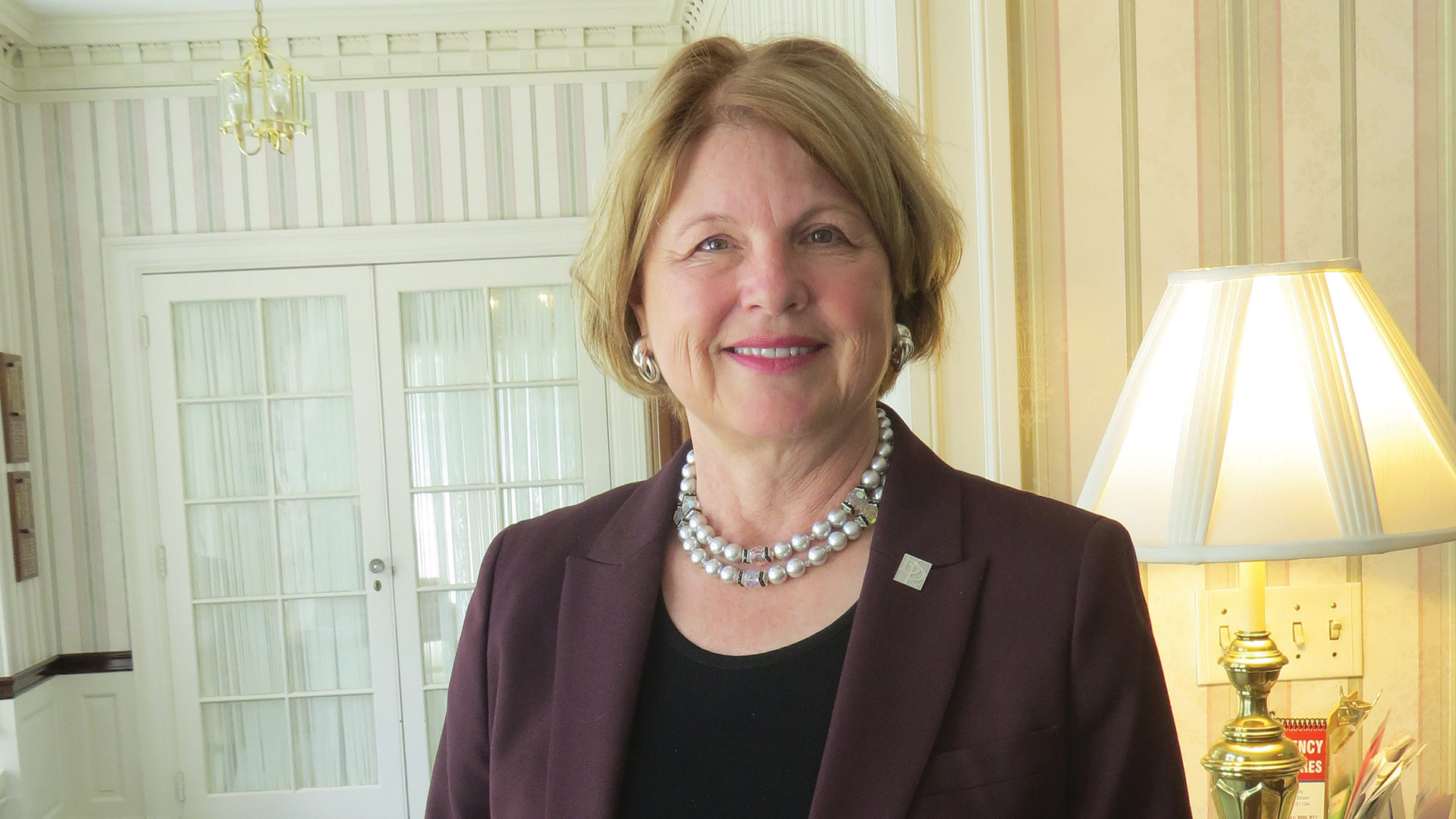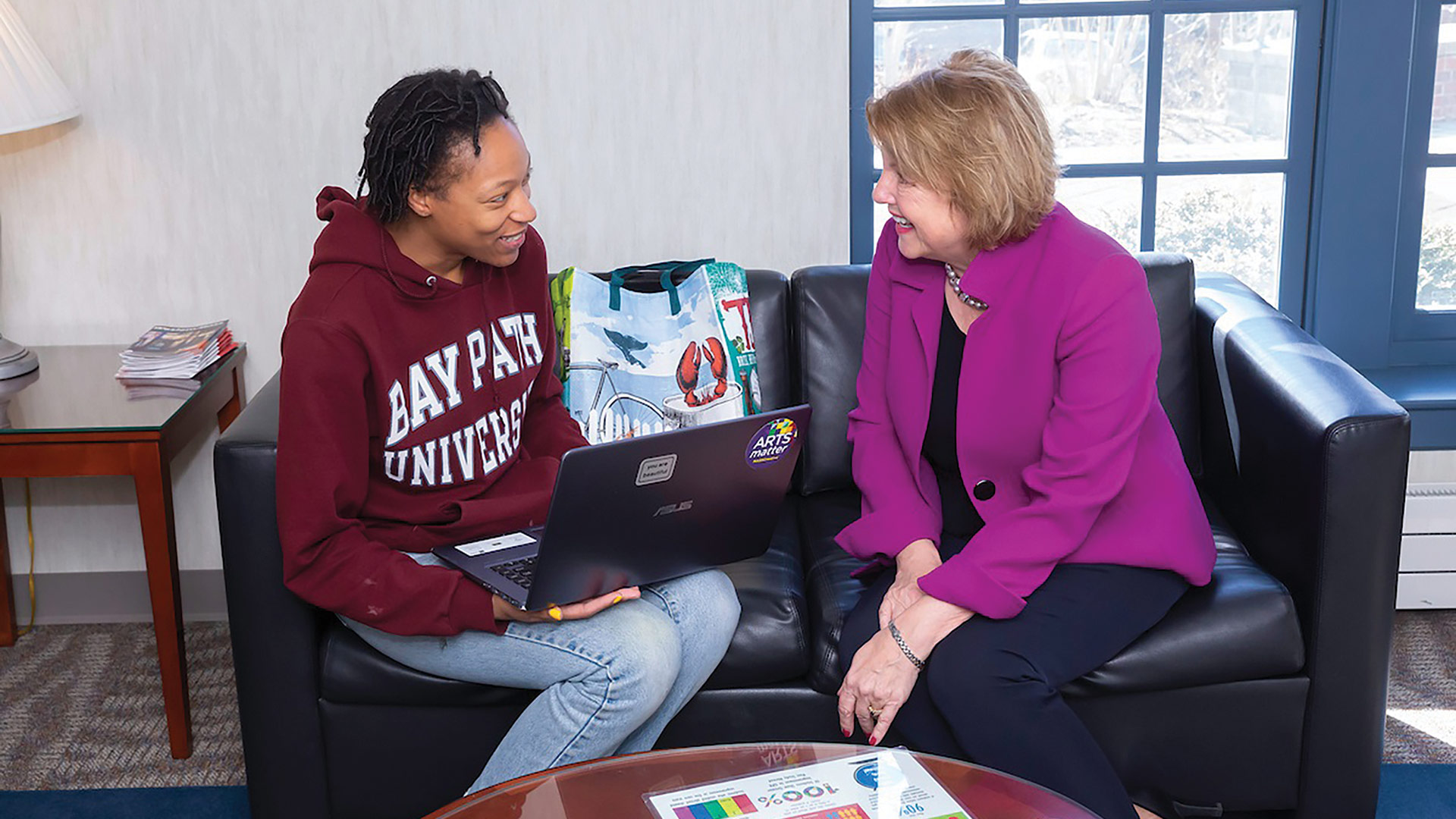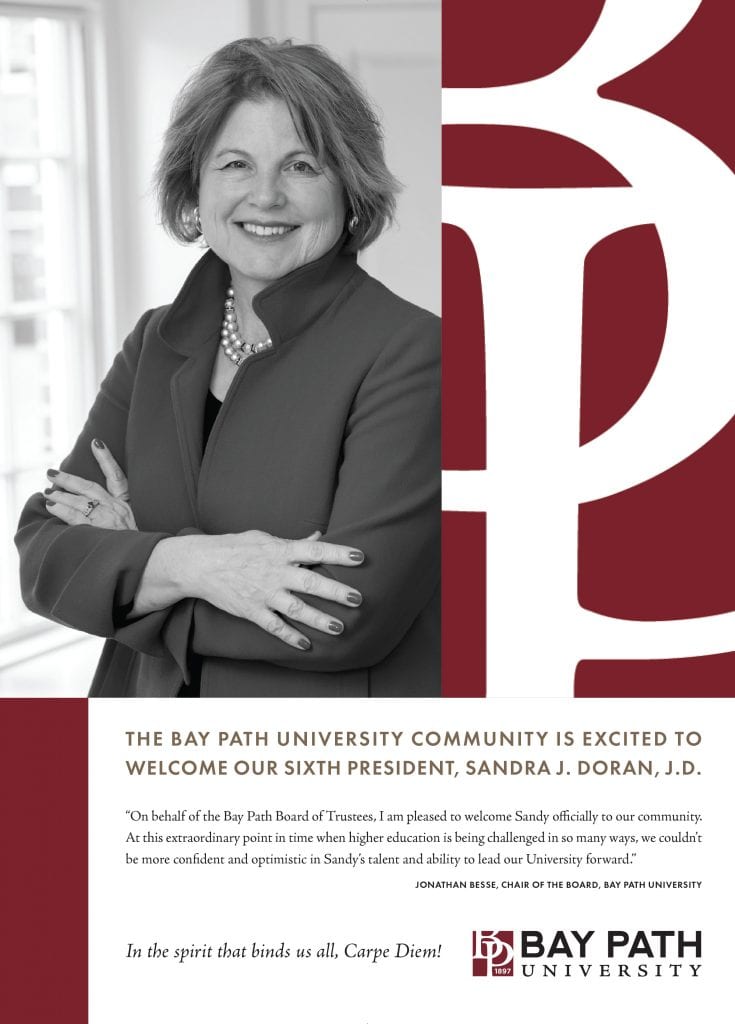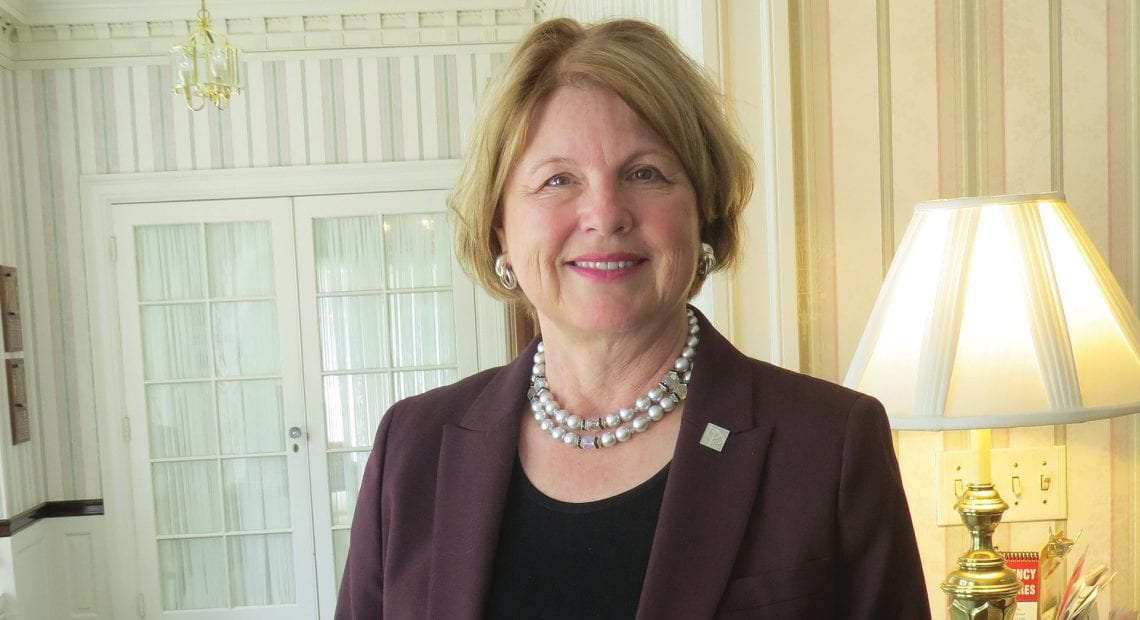‘This Is Our Moment’

While the pandemic presents a number of challenges, Sandra Doran says, it might also create opportunities for Bay Path University.
Sandra Doran says her family has long been attracted to careers in education and the law.
One great-grandfather traveled from New York to Colorado and set up the first one-room schoolhouse in that state, she noted, while her grandfather was superintendent of a school district in New York City, and her mother was a music teacher. And her other great-grandfather was a bankruptcy lawyer, kept especially busy during the Great Depression.
So it’s logical she would take one of those career paths. Actually, she took both.
Indeed, after serving as chief legal officer for Shaw’s supermarkets, she later served as vice president, general counsel, and chief of staff at Lesley University in Cambridge. And it was that position that eventually inspired a full shift to higher education — although she always calls on her legal background — and put her on a path to … Bay Path University and its president’s office.
“At Lesley, I came to realize that higher education was my passion, and my calling,” said Doran, who’s been handed the attractive, but perhaps also daunting, assignment of succeeding Carol Leary and building on the strong foundation she built during a 25-year tenure that saw the college become a university and expand in every way imaginable.
She arrives at Bay Path at a critical juncture, when several powerful forces are colliding — stern challenges in higher education that started emerging years ago; the COVID-19 pandemic, which is exacerbating those challenges and creating new ones; a financial crisis; and a nationwide focus on racial justice.
“This is a historical leadership opportunity for all of us — how we lead through the months and years ahead is really going to define what kind of community we are, how resilient we are, and now adaptive and nimble we are.”
This collision of crises, as Doran called them, presents a real test — actually, several of them — but also opportunities for the school, and higher education in general.
“This is a historical leadership opportunity for all of us — how we lead through the months and years ahead is really going to define what kind of community we are, how resilient we are, and now adaptive and nimble we are,” said Doran, adding that she believes Bay Path is well-positioned to be a leader during this time of crisis, introspection, and profound change, and that she is looking forward to the challenge of helping it play that role.
As she talked with BusinessWest at a small table positioned on the lawn behind the college’s administration building, Deepwood Hall — a nod to social distancing and keeping safe during the pandemic — Doran talked about the college’s plans for reopening this fall. It will embrace what many are calling a hybrid model blending online and in-person classes, with far more of the former. The plan, overall, is to “de-densify the campus,” as she put it, with a limited number of students living on campus, all in single rooms.
But mostly, she talked about this convergence of crises and how, rather than be a roadblock or even a speed bump, it could serve to accelerate the process of Bay Path’s emergence as a leader not simply in remote learning — only she doesn’t call it that; she prefers ‘technology-assisted learning’ — but in guiding students to fulfillment of their goals and ultimate success in the workplace. And also accelerating the process of creating systemic change in how higher education carries out its mission.
For the school, this opportunity to further cement its reputation as a pioneer and frontrunner in remote learning has been confirmed by the large number of colleges and universities calling to seek assistance as they establish or build their own programs (more on that later).
And for higher education, the pandemic presents a unique if not entirely welcome (at some schools) opportunity to rethink and perhaps reinvent many aspects of a college education and put more (and much-needed) emphasis on cost, access, and pathways to success in the workplace, and less on the on-campus experience (more on that later as well).
For all of this, Bay Path is well-positioned, if not uniquely positioned, to grasp these opportunities.
“This is our moment at Bay Path,” she said with noticeable energy in her voice, “because we’ve always been that place where students come to further their career ideals, and we’re going to continue to provide that opportunity.”
For this issue and its focus on education, BusinessWest talked at length with Doran about what she ultimately called “an exciting moment in time,” and all the reasons that make it so.
School of Thought
When asked what appealed to her about Bay Path and its presidency, Doran said, in essence, that there was little, if anything, that didn’t appeal to her.
Indeed, she said the once-struggling two-year college that was resurrected and then taken to dizzying new heights during Leary’s tenure represents an opportunity that brings together her collective passions and many of the initiatives that have marked the latter stages of her career.
These include women’s education, technology and technology-assisted learning, entrepreneurship, and innovation.

Sandra Doran, seen here with a student on Feb. 27, the day she was introduced to the campus community, embraces the challenge of building on the foundation built by her predecessor, Carol Leary.
“This opportunity is a perfect fit and really the culmination of all my professional work,” she explained. “I’ve had the opportunity to lead a women’s college, so I understand the value of a women’s education. But another part of my background involves adaptive learning and the power of online education to really bring out the best of everyone in terms of mastering the subject matter and ensuring that everyone has a voice. I’ve also led a software company and been an entrepreneur. This opportunity brings all that together, and that’s why it’s a perfect fit.”
A quick recap of her career to date will explain why she said that.
We start at Shaw’s, where Doran, in addition to her work as general counsel, oversaw the company’s portfolio of mergers and acquisitions, which included the acquisition of Star Market Inc.
Later, at Lesley, which she also served as general counsel, she came to that realization that higher education was a passion, one that led her to pursue and then garner the role of president of American College of Education, an online doctoral institution serving more than 3,500 students.
From there, while serving as an entrepreneur in residence at Stevens Institute of Technology in Hoboken, N.J., she served as the CEO of Castle Point Learning Systems, a Stevens Institute-supported educational technology startup that had developed an instructional framework for calculus, enabling students and teachers to develop a more robust foundation for higher-level mathematics.
Concurrently, she took a position as National Policy director for the New England Board of Higher Education, where, among other responsibilities, she created and implemented an innovative initiative for multi-state collaboration to increase educational attainment and access for students through online, hybrid, and distance education.
Her career then took another intriguing turn when she was appointed president of Salem Academy and College in North Carolina, the country’s oldest women’s college, founded in 1772. There, she put the school on firm financial footing, developed a strategic plan, and initiated several new programs, including an entrepreneurial makerspace in downtown Winston-Salem where students could work directly with the city’s innovation ecosystem.
As noted earlier, while education has become her career, she calls on her background in law on an almost daily basis, and finds that the two professions coexist effectively.
“One of the great roles of lawyers is to educate,” she explained. “It’s to educate clients, to educate themselves, to mediate, to bring people together, to critically analyze the data and synthesize the data, and communicate. Lawyers are problem solvers, except for the high-profile ones, which are litigators; most lawyers are solving problems.”
When a search firm called last year to gauge her interest in the Bay Path position, she responded enthusiastically, and for the reasons — and passions — mentioned earlier.
“I was familiar with the pioneering aspects of Bay Path — it was one of the first institutions to immerse themselves in the online education experience and understand what that could provide for our students,” she explained, adding, again, that she viewed this opportunity as the culmination of all the career work that had come before it.
“Many schools don’t have an online presence at all, and so imagine their consternation when faced with this pandemic. It’s interesting that other liberal-arts colleges are reaching out to us and looking to us as being able to provide that kind of education.”
Since arriving on campus late last month, Doran, while working with staff on the reopening plan, has also been trying to meet with local leaders and the campus community alike — in COVID-mandated ways, especially phone calls and Zoom meetings.
It’s not the same as meeting people in person, but it’s been effective in that she’s getting to know and better understand the community the school serves. And this work continues with an initiative she calls “Let’s Come Together: Virtual Conversations with President Doran.”
“I’m eager to get to know my colleagues, and they’re eager to get to know me,” she said. “So these are conversations we’re conducting virtually, almost one a day — so faculty and staff have an opportunity to sit and talk and learn about each other. It’s a great opportunity for me to learn about our staff and faculty and what excites them about Bay Path, and, frankly, to learn about areas of strength and areas we need to improve.”
Course of Action
Doran was introduced to the Bay Path community on Feb. 27, just before the school sent its students home for the semester and essentially closed the campus. By the time of that announcement, it was already becoming clear that the approaching pandemic could alter the calendar and impact lives — but no one could really have predicted just how profoundly the landscape would change or how schools would be challenged by the virus.
As the story on page 17 reveals, schools have been spending the past several weeks carefully putting together reopening plans for the fall that incorporate a host of different strategies.
For Bay Path, the assignment, while not easy by any stretch, was made less complicated by what could be called the school’s head start when it came to online programs. Its first fully online graduate program was the MS in Nonprofit Management & Philanthropy, launched in 2007, followed by other online graduate programs for men and women and the fully online bachelor’s-degree program offered by the American Women’s College.
SEE: List of Colleges
Bay Path’s plan, blueprinted with the help of a 75-member task force, calls for essentially cutting the number of students living on campus by half — down to roughly 200 — and conducting most courses, except those with some lab component, online. It’s a plan the school feels comfortable with because so many of its students were already learning remotely.
“It’s an environment where we’re making decisions with imperfect information — our environment is changing on a weekly basis, if not on a daily basis,” Doran noted. “So we’re going to be ready to pivot if we need to, but we feel strongly that we’ve got the right plan in place.”
This head start with remote learning has certainly caught the attention of others in academia, she added, noting those phone calls and e-mails seeking Bay Path’s assistance with online programming and inquiring about potential partnership opportunities.
“We’ve had several schools reach out to us to ask if they can enroll their students in our courses or think about ways we can partner,” she told BusinessWest, noting that inquiries are coming from institutions across the country. “Many schools don’t have an online presence at all, and so imagine their consternation when faced with this pandemic. It’s interesting that other liberal-arts colleges are reaching out to us and looking to us as being able to provide that kind of education.
“They want to learn from what we’ve learned,” she went on. “So it’s exciting to be in that position of being able to share what we know, what we’ve learned about how to provide the best opportunities for students.”
And these phone calls represent just one of the opportunities, a strange word to use in this climate, to arise from the pandemic, said Doran, adding that she chooses to look upon them in that light.
“We have an opportunity to rethink how we meet the needs of students whose ideals and thoughts around higher education are changing in the midst of everything that we’re dealing with,” she said. “So, just as the pandemic is impacting every single person in terms of how they think about their own career and their own lives, our students are doing the same thing.”
Elaborating, she noted that fewer than 20% of those attending college today are having what would be called a traditional college experience, meaning a four-year school and living on campus.
“The other 80% attend a very different — and have a very different — college experience,” she went on. “And one’s not better than the other, but I think there’s a new reality that higher education is embracing that’s focusing on the academic part of the experience, the part of the experience that enables students to have productive careers and move forward with their life goals and their life dreams.
“And that’s what Bay Path has always been — our mission is rooted in this idea that we want to provide career paths,” she continued, noting, again, that the school is well-positioned to embrace this new reality, as she called it, and this is reflected in enrollment numbers for the fall, which are quite solid at a time when many schools are struggling.
“We have — and this is another strength of Bay Path — a very diverse set of students,” she said. “We have students who are only online students, so they were never contemplating coming to campus, so we feel secure in those enrollments; we have graduate students, many of whom are online, so we feel secure in those enrollments; and our undergraduate enrollment is up for this fall in terms of deposits and commitments. We’re feeling very confident, and we’ve had a good response to our plan.”
Overall, the school is on solid financial ground, Doran said, and in a good position to withstand the challenges created by the pandemic.
“The finances around higher education are always challenging,” she explained. “The pandemic has certainly raised another level of gauze around all this, because it’s hard to see through and see what the next steps are. But we have a number of task forces looking at the long-term aspects, and, overall, we see some opportunities.”
Bottom Line
Looking ahead … well, Doran acknowledged it’s difficult to look very far ahead in the era of COVID-19.
Her immediate goals are to continue building on the foundation that Leary has built and develop new growth opportunities for a school that has come a long way in the past quarter-century.
And rather than somehow slow or stifle those efforts, this convergence of crises that greeted her upon her arrival may, as she said, actually serve to accelerate that process.
As she noted, “this is our moment.”
George O’Brien can be reached at [email protected]






